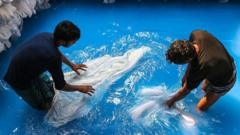Alchemie Technology is making strides in the textile dyeing industry with the introduction of a groundbreaking machine known as Endeavour, which aims to mitigate the environmental impact associated with traditional dyeing methods. Situated in a rural part of Taiwan, the company is in the testing phase of this innovative approach, which employs the principles of inkjet printing to precisely apply dye onto fabric.
According to Alchemie's founder, Dr. Alan Hudd, traditional fabric dyeing involves soaking textiles in large quantities of water under high temperatures for multiple hours, resulting in not only massive water consumption but also substantial toxic wastewater production. This ethos has persisted since its inception over 175 years ago in England’s textile mills.
Statistics presented by the World Resources Institute highlight severe drawbacks of conventional dyeing practices: the industry consumes approximately five trillion liters of water annually for dyeing, contributing to 20% of the world's industrial water pollution and accounting for around 10% of global carbon emissions.
In contrast, Alchemie asserts that its Endeavour machine can decrease water consumption by an impressive 95% and energy usage by as much as 85%, drastically improving processing time by three to five times compared to conventional methods.
Other companies, such as China's NTX and Sweden's Imogo, strive for similar advancements in dyeing processes. However, experts like Kirsi Niinimäki from Finland's Aalto University encourage more data on long-term effectiveness and the durability of fabrics processed through these new technologies.
While Alchemie's efforts are promising, technical challenges, such as adapting the Endeavour machine to function optimally in a humid climate, must be addressed. The company's operations head remarks that moving from research and development to commercial application presents real challenges, especially when dealing with a broader textile market that demands large quantities of dyed fabrics.
With ambitious plans set for further expansion into South Asia and Portugal by 2025, Alchemie faces the challenge of scaling its operations to meet the needs of major fashion retailers, which could require hundreds of their machines working concurrently.
As sustainable innovations like Alchemie's Endeavour emerge in the textile industry, there exists potential for significant ecological advancement in fashion, although the path to widespread adoption remains laden with obstacles.
According to Alchemie's founder, Dr. Alan Hudd, traditional fabric dyeing involves soaking textiles in large quantities of water under high temperatures for multiple hours, resulting in not only massive water consumption but also substantial toxic wastewater production. This ethos has persisted since its inception over 175 years ago in England’s textile mills.
Statistics presented by the World Resources Institute highlight severe drawbacks of conventional dyeing practices: the industry consumes approximately five trillion liters of water annually for dyeing, contributing to 20% of the world's industrial water pollution and accounting for around 10% of global carbon emissions.
In contrast, Alchemie asserts that its Endeavour machine can decrease water consumption by an impressive 95% and energy usage by as much as 85%, drastically improving processing time by three to five times compared to conventional methods.
Other companies, such as China's NTX and Sweden's Imogo, strive for similar advancements in dyeing processes. However, experts like Kirsi Niinimäki from Finland's Aalto University encourage more data on long-term effectiveness and the durability of fabrics processed through these new technologies.
While Alchemie's efforts are promising, technical challenges, such as adapting the Endeavour machine to function optimally in a humid climate, must be addressed. The company's operations head remarks that moving from research and development to commercial application presents real challenges, especially when dealing with a broader textile market that demands large quantities of dyed fabrics.
With ambitious plans set for further expansion into South Asia and Portugal by 2025, Alchemie faces the challenge of scaling its operations to meet the needs of major fashion retailers, which could require hundreds of their machines working concurrently.
As sustainable innovations like Alchemie's Endeavour emerge in the textile industry, there exists potential for significant ecological advancement in fashion, although the path to widespread adoption remains laden with obstacles.

















